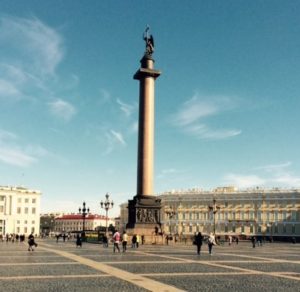
On June 27th, NATO continued on with its needlessly provocative actions by mounting war games in western Ukraine. Press TV provides details:
The war games, dubbed Rapid Trident 2016, kicked off at 9 am local time on June 27 at the International Peacekeeping and Security Center (IPSC) in Yavoriv in western Ukraine, Ukraine’s Defense Ministry said.
At least 2,000 troops from more than 14 NATO member states and their partners in eastern Europe are attending the exercises, according to the ministry. The maneuvers will involve military equipment, including armored vehicles, military helicopters and aircraft. The first part of the annual military exercise will come to an end on July 8.
Conducted annually, Rapid Trident this year involves Ukraine, the United States, Belgium, Bulgaria, Canada, Georgia, The United Kingdom, Moldova, Lithuania, Norway, Poland, Romania, Sweden and Turkey.
Fox News has additional details, including a quote from Russia’s ambassador to NATO in reply to the maneuvers:
“Those measures significantly erode the quality of regional security, in fact turning central and eastern Europe into an arena of military confrontation,” Russia’s ambassador to NATO Alexander Grushko said, adding that NATO’s decision “directly infringes on our legitimate security interests” and “won’t be left unanswered”.
The NATO allies also discussed establishing a Romanian-led multinational “framework brigade” of ground troops to help defend the Black Sea area.
Grushko also criticized NATO’s pledge to offer non-lethal assistance to Ukraine, saying it could encourage its reluctance to abide by the Minsk-2 peace agreement for eastern Ukraine. The deal has helped reduce hostilities in eastern Ukraine, but fighting has continued and a political settlement has stalled.
More than 9,300 people have been killed in fighting between Ukrainian forces and Russia-backed separatists [sic] in eastern Ukraine, which erupted in April 2014 weeks after Moscow’s invasion of Crimea.
Meanwhile, Turkey’s president Erdogan sent an apology letter to Russian President Putin with respect to the shooting down of a Russian SU-24 last November, an incident in which the pilot was shot to death after bailing from the plane. Another Russian pilot was killed while trying to mount a rescue operation by helicopter. A member of a reactionary Turkish militia who confessed to the shooting murder of the Russian SU-24 pilot has been arrested and is awaiting trial in Turkey.
After receiving the letter, Putin called Erdogan. For an analysis of what was agreed to by Putin and Erdogan in the phone call, see:
http://russia-insider.com/en/politics/what-putin-and-erdogan-agreed-ten-main-points/ri15325
Putin reportedly offered his condolences to Erdogan on the recent terror attacks at Turkey’s main airport.
Professor Paul Robinson, over at the Irrussianality blog, discusses a Canadian intelligence report that just came out, which acknowledges that Russia is not circling the drain but is actually holding up reasonably well. Robinson notes:
‘Russia is doomed’ is a common refrain of newspaper articles and think tank reports. It is quite refreshing, therefore, to read something which while not entirely optimistic about Russia’s immediate future is nonetheless a little more circumspect. A new report issued by the Canadian Security Intelligence Service (CSIS), entitled 2018 Security Outlook: Risks and Threats, aims ‘to explore the drivers influencing the security risks and potential threats related to specific regions of the world and themes by the year 2018.’ According to the introduction, ‘five leading global thinkers were commissioned’ to write about China, the Middle East, Russia, weapons of mass destruction, and ‘state power and cyber power’. CSIS doesn’t reveal who these ‘leading global thinkers’ are, but the one responsible for the chapter on Russia has produced 15 pages of sober analysis without any of the hyperbole normally associated with the subject.
Russia analyst Alexander Mercouris, motivated by observations due to his attendance at the recently concluded St. Petersburg International Economic Forum, has written an interesting piece explaining Putin’s “grand strategy” for Russia’s future: a greater Eurasian economic zone. The Eurasian Economic Union, a free trade zone that includes Russia, Belarus, Kazakhstan, Armenia and Kyrgyzstan, will be working in tandem with China’s One Belt, One Road project, and the goal is to eventually get the EU to become a partner, creating a greater Eurasian economic zone with Russia serving as the bridge nation between the East and West.
Mercouris writes:
This is not only a strategy; it is a hugely ambitious – even grandiose – strategy. It aims to link the two sides of the Eurasian continent into a single economic space with Russia at the centre, acting as the link and bridge. It is a proposal not for a “Eurasia” but for a “Greater Eurasia”: a single colossal economic unit extending all the way from the Pacific to the Atlantic. Moreover it is quite clear this project is fully supported by the Chinese leadership, China of course being the eastern half of the project. Indeed it is a certainty the Chinese had a hand in making it and that their Silk Road project is part of it.
Far from seeking the break-up of the EU as so many neocon writers in the West claim, what Putin wants is the EU to become a full partner in this project. Far from being forced to choose between “Russia in Europe” and “Russia in Eurasia”, Putin sees no contradiction in working towards both. Far from wanting to choose between the EU and China as Russia’s partner, Putin wants Russia to have a partnership with both of them, bringing the two together.
Read the full article here:
This posting is extremely nicely written, and it in addition consists of numerous beneficial info. I appreciated you might be specialist manner of creating this blog post. Thanks, you have produced it simple and easy for me to comprehend.
Really good blog, thank you so much for your effort in writing this post.